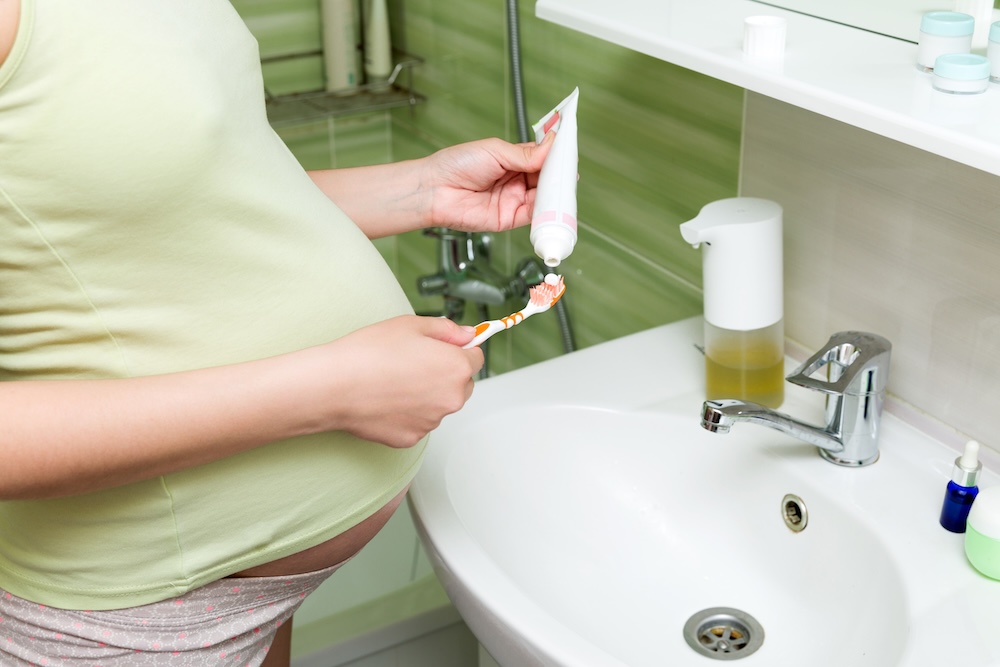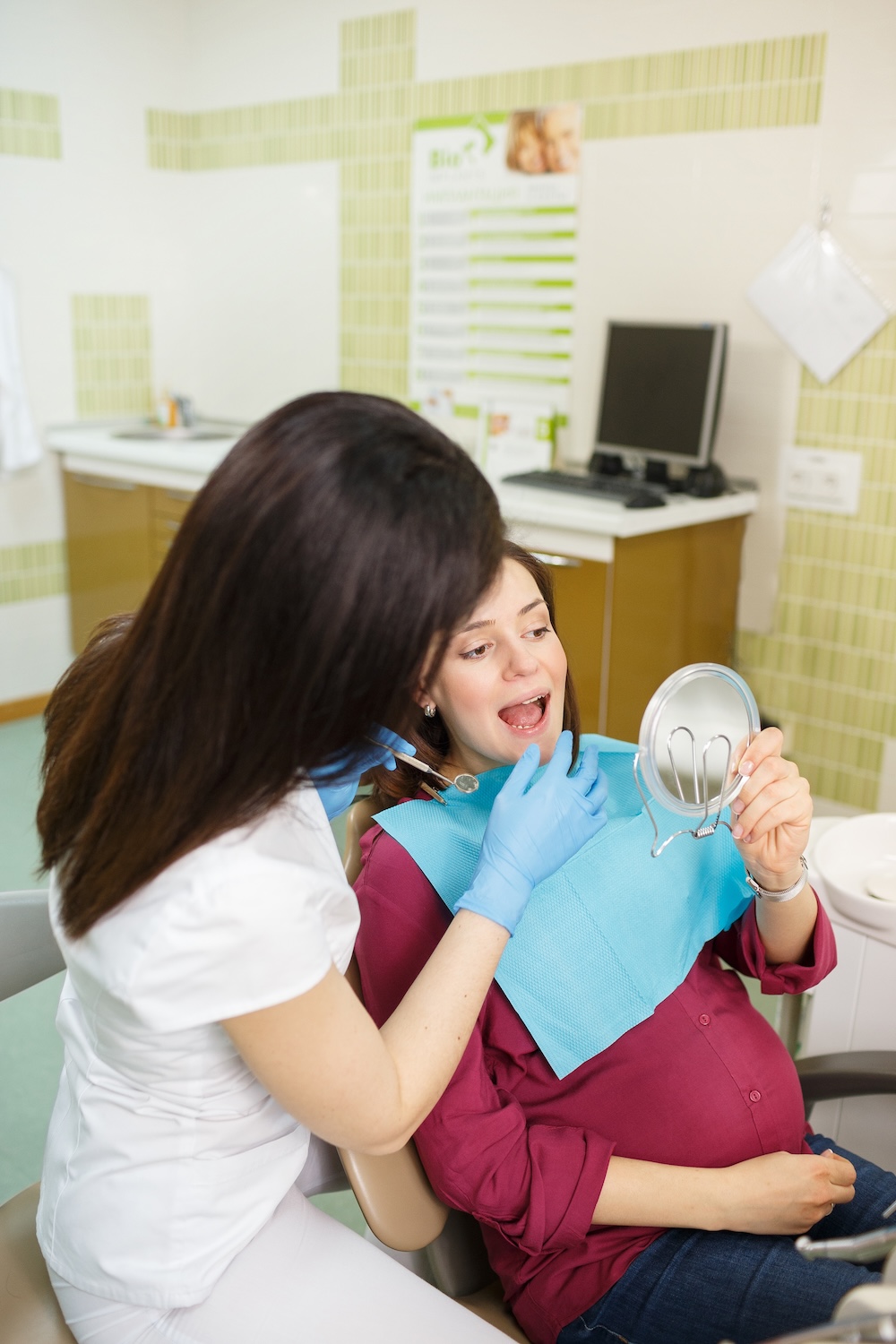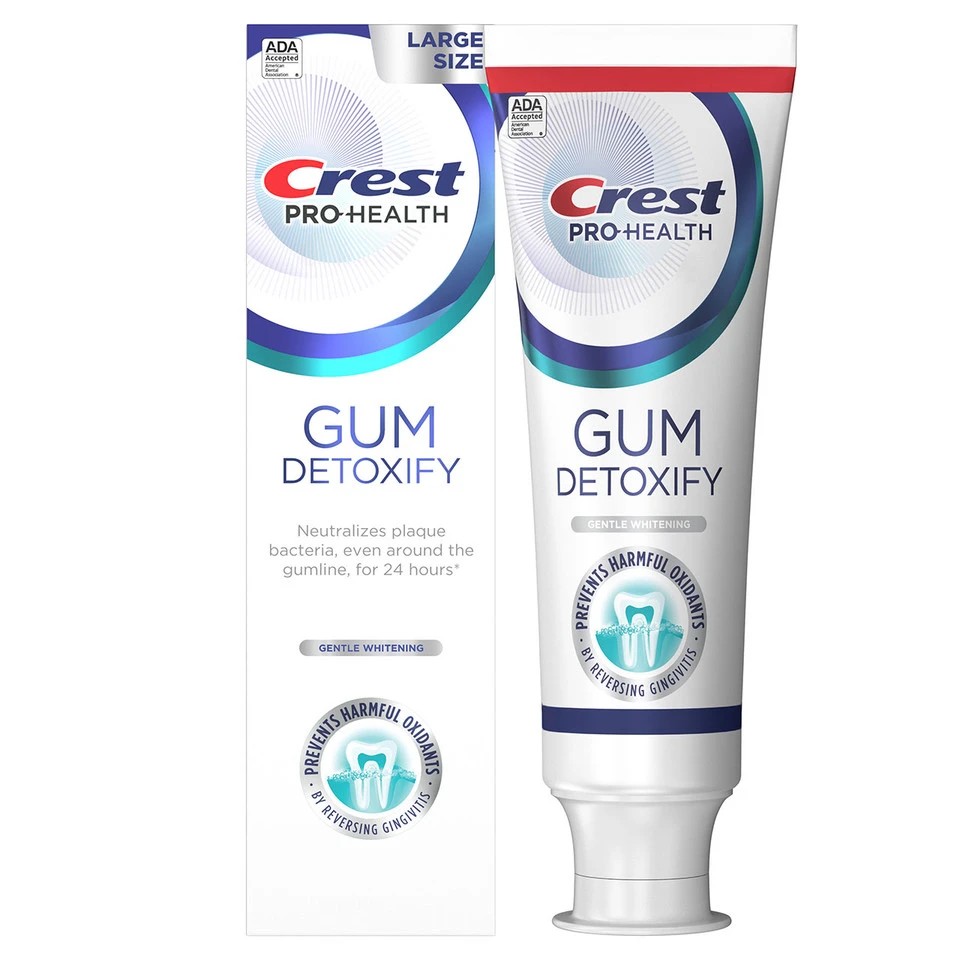Pregnancy Gingivitis: Causes, Treatment, And Prevention

Summary
Key Takeaways
- Pregnancy gingivitis is inflammation of the gums caused by hormonal changes during pregnancy.
- It tends to be most pronounced during the second trimester.
- Common signs include swollen, red gums that bleed easily, especially when brushing or flossing.
- Daily brushing, flossing, and regular dental visits can help manage and prevent this condition.
- Left untreated, it can lead to periodontal disease, which may affect overall health.
- Brushing twice a day with a soft-bristled toothbrush, regular dental checkups, and eating a healthy diet, are key steps in prevention.
Table of Contents

This blog has been reviewed and approved by Dr Robert Lee, a dental professional of 35 years
LEARN MORE >Key Takeaways
What Is Pregnancy Gingivitis?

Pregnancy gingivitis is a mild form of gum disease that causes irritation, redness, and swelling of your gums. It’s directly linked to the large hormonal shifts that happen during pregnancy, especially the increase in progesterone. These changes make it easier for plaque, a sticky film of bacteria, to build up and trigger an irritated response in your gums.
This condition is most common during the second trimester, though some women may notice symptoms earlier or later. It's not dangerous by itself, but if left unaddressed, it can progress into more serious gum issues like periodontitis. So, it’s good to get ahead of it the minute you notice any issues.
What Causes It?

There are a few key factors behind the development of pregnancy gingivitis:
Hormonal Changes
During pregnancy, your body produces more progesterone. Among other things, this affects how your gums respond to plaque. It also increases blood flow to the gum tissue, making it more sensitive, swollen, and prone to bleeding.
Plaque Buildup
Plaque is the main culprit behind any form of gum disease. If it’s not removed through regular brushing and flossing, plaque hardens into tartar, which irritates the gums and causes inflammation.
Morning Sickness
Frequent vomiting from morning sickness can expose your teeth and gums to stomach acids, which irritate gum tissue and weaken your mouth’s defenses.
Changes in Eating Habits
Cravings or snacking more often, especially on sugary foods, can increase the risk of plaque and gum issues, especially if you're not cleaning your teeth regularly.
Neglecting Oral Care
Some expectant mothers may unintentionally skip brushing or flossing due to nausea, fatigue, or sensitivity. Unfortunately, this only increases the risk of getting gingivitis.
Why It Matters: Risks of Untreated Gingivitis
Mild pregnancy gingivitis may seem like a small problem, and it might be easy to ignore since you’ve got a lot going on. But that can lead to complications. If gum inflammation worsens, it can turn into periodontitis, a more serious gum infection that damages the tissue and bone supporting your teeth.
Some research, including studies cited by the American Dental Association, suggests that untreated gum disease during pregnancy may be linked to preterm birth and low birth weight. All the more reason to take it seriously as soon as you notice something.
Signs and Symptoms to Watch For
Pregnancy gingivitis can range from barely noticeable to very uncomfortable. Common symptoms include red, swollen gums, tenderness in the gums, or bleeding when brushing or flossing. Persistent bad breath can be another indicator, or, in more advanced cases, a receding gum line.
Some women also experience “pregnancy tumors” or pyogenic granulomas. These are non-cancerous growths on the gums that usually disappear after birth. They can look alarming but are usually harmless and caused by the same hormonal changes.
If you notice symptoms or have symptoms that are getting worse, you shouldn’t wait until your next checkup. Call your dentist right away if:
- Your gums bleed frequently or heavily
- You see pus or develop a bad taste in your mouth
- A lump forms on your gums
- You feel pain when chewing
- Your teeth feel loose or gum recession worsens
Treatment Options
Luckily, pregnancy gingivitis is very treatable. Here’s what you can do:
- Improved At-Home Care
Brush twice a day using a soft-bristled toothbrush to go easy on the gums and fluoride toothpaste. Floss gently once a day to remove plaque between your teeth. Use an antimicrobial mouthwash if your dentist or dental hygienist recommends it. - Professional Dental Cleaning
Nothing beats a deep cleaning by a dental hygienist to remove plaque and tartar buildup. This is safe during pregnancy and often provides quick, effective relief. - Saltwater Rinses
A warm saltwater rinse can help soothe irritated gums and reduce inflammation naturally. All it takes is ½ teaspoon of salt in 1 cup of warm water. - Diet Adjustments
Cut back on sugary snacks and eat foods rich in vitamins C and A instead. Those types of foods support gum health and immune response. - Stay Hydrated
Drinking water throughout the day helps wash away food particles and bacteria. It can also reduce dry mouth, which may worsen gum problems. - Manage Morning Sickness
If you’re vomiting regularly, rinse your mouth afterward to neutralize your stomach acid before brushing. You can rinse with water or a baking soda solution.
Prevention Tips During Pregnancy

Preventing pregnancy gingivitis isn’t complicated, but it does take some awareness, effort, and consistency. Here are some simple, straightforward steps to stay ahead of it.
- Schedule a dental checkup early in pregnancy and again mid-pregnancy if needed.
- Let your dentist or dental hygienist know you’re expecting—they’ll adjust your care accordingly.
- Brush twice a day, for at least two minutes, and floss daily.
- Use a soft toothbrush to avoid irritating sensitive gums.
- Stay on top of your prenatal vitamins, especially those with folate and vitamin C.
- Resist sugary foods and drinks as much as you can, and rinse after meals when you can’t brush.
- If flossing is uncomfortable, instead of avoiding it, try a water flosser or softer floss options.
What Happens After Birth?
For most people, pregnancy gingivitis improves after delivery as hormone levels return to normal. That said, you shouldn’t assume it will go away on its own; postpartum dental care is just as important. If symptoms persist, a follow-up dental exam can help rule out other gum issues and keep your oral health comeback on track.
Summary
Pregnancy gingivitis is a common and manageable condition that affects many expecting moms due to hormonal changes, increased blood flow, and plaque buildup. It typically shows up during the second trimester and causes red, swollen, or bleeding gums. While it might seem minor, ignoring it can lead to more serious gum problems or even affect pregnancy outcomes.
Fortunately, good oral hygiene, regular dental visits, and healthy eating habits can go a long way in preventing and treating it. Brushing twice a day with a soft toothbrush, gentle flossing every day, as well as saltwater rinses, can soothe irritation and keep pregnancy gingivitis at bay.
Of course, if symptoms worsen or don't go away after giving birth, consult your dentist. With a little care and attention, you can keep your mouth healthy through every stage of pregnancy.
Good Oral Hygiene Starts with Oral-B
Healthy gums are crucial to tooth and mouth health. In the event of gum disease (also known as gingivitis), the first line of defense is to see a dental professional. They can do a proper examination, determine the level of periodontal disease, and recommend treatments. But there are things you can do to help.
- When you brush with an Oral-B iO electric toothbrush, you can help protect your gums and manage the progression of recession. Oral-B iO helps you avoid new tooth and gum issues—and if you have existing gum problems, it can help improve them more effectively than a manual toothbrush.
- The right brush head also makes a big difference in effective cleaning without gum irritation. So pair your toothbrush with specialized Oral-B brush heads, like the Oral-B iO Gentle Care replacement brush head, which is designed for an effective yet gentle clean along the gumline.
- Crest Toothpaste contains stannous fluoride which fights the plaque bacteria that cause gum disease. Pair that with an Oral-B iO electric toothbrush to help reduce gum bleeding and improve overall gum health.
- Mouthwash can be an important part of your daily oral health routine. The best mouth rinses, like Crest Pro-Health Multi-Protection Mouthwash are clinically proven to provide 24-hour protection against plaque and gingivitis with twice-daily use.
- Dental floss, used daily, helps prevent gingivitis as part of a complete dental plan. Look for a floss that can fit more easily into tight spaces, such as Glide Floss.
There is a connection between oral health and systemic health. Oral-B has created a line of products to help a variety of oral health conditions. Because, as a champion of good oral health for all, we know it has other positive health benefits. Research has associated oral health issues with whole body diseases, such as dementia, diabetes and cardiovascular disease. That’s why, beyond helping with issues such as tooth decay, gum disease and tooth loss, our products can help prevent and reduce plaque bacteria before they spread to other parts of the body.
FAQs
-
Is gingivitis common during pregnancy?
-
When does pregnancy gingivitis start?
-
How to get rid of pregnancy gingivitis?
-
Does pregnancy gingivitis go away?
Sources
- https://www.cdc.gov/oral-health/hcp/conversation-tips/talking-to-pregnant-women-about-oral-health.html
- https://www.ada.org/resources/ada-library/oral-health-topics/pregnancy
- https://my.clevelandclinic.org/health/diseases/22717-pyogenic-granuloma
- https://my.clevelandclinic.org/health/diseases/22484-pregnancy-gingivitis
Chen, C. K., et al. (2017). Association between chronic periodontitis and the risk of Alzheimer's disease: A retrospective, population-based, matched-cohort study. Alzheimer's Research & Therapy, 9, 56. https://doi.org/10.1186/s13195-017-0282-6
Geurs, N. C., et al. (2023). A Randomized Controlled Clinical Trial of Prenatal Oral Hygiene Education in Pregnancy-Associated Gingivitis. Journal of Midwifery & Women's Health, 68(4), 507–516. https://doi.org/10.1111/jmwh.13486
Grossi, S. G., et al. (1998). Periodontal disease and diabetes mellitus: A two-way relationship. Annals of Periodontology, 3, 51-61. https://doi.org/10.1902/annals.1998.3.1.51
Janket, S. J., et al. (2003). Meta-analysis of periodontal disease and risk for coronary heart disease and stroke. Oral Surgery, Oral Medicine, Oral Pathology, Oral Radiology, and Endodontology, 95, 559-569. https://doi.org/10.1067/moe.2003.107
Parry, S., et al. (2023). Evaluation of an advanced oral hygiene regimen on maternity outcomes in a randomized multicenter clinical trial (Oral Hygiene and Maternity Outcomes Multicenter Study). American Journal of Obstetrics & Gynecology MFM, 5(8), 100995. https://doi.org/10.1016/j.ajogmf.2023.100995
Sutor, S., et al. (2025). Effect of a powered and a manual toothbrush in subjects susceptible to gingival recession: A 36-month randomized controlled clinical study. International Journal of Dental Hygiene, 23(1), 26–36. https://doi.org/10.1111/idh.12834
Table of Contents
- What Is Pregnancy Gingivitis?
- What Causes It?
- Why It Matters: Risks of Untreated Gingivitis
- Signs and Symptoms to Watch For
- Treatment Options
- Prevention Tips During Pregnancy
- What Happens After Birth?
- Good Oral Hygiene Starts with Oral-B
-
- FAQs
- Sources

This blog has been reviewed and approved by Dr Robert Lee, a dental professional of 35 years
LEARN MORE >
Sign Up
for gum care tips, expert advice, and exclusive offers.

Sign Up
for gum care tips, expert advice, and exclusive offers.



